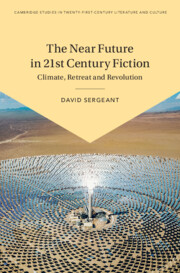Book contents
- The Near Future in Twenty-First-Century Fiction
- Cambridge Studies in Twenty-First-Century Literature and Culture
- The Near Future in Twenty-First-Century Fiction
- Copyright page
- Contents
- Acknowledgements
- Introduction
- Chapter 1 The Domestic Near Future 1
- Chapter 2 The Domestic Near Future 2
- Chapter 3 State of the Arts
- Chapter 4 Diagnostic Dead-Ends
- Chapter 5 The Art of History
- Chapter 6 Identity and Power
- Chapter 7 In Search of Revolution
- Chapter 8 The Genre of Revolution
- Notes
- Bibliography
- Index
Chapter 8 - The Genre of Revolution
Kim Stanley Robinson’s New York 2140
Published online by Cambridge University Press: 07 August 2023
- The Near Future in Twenty-First-Century Fiction
- Cambridge Studies in Twenty-First-Century Literature and Culture
- The Near Future in Twenty-First-Century Fiction
- Copyright page
- Contents
- Acknowledgements
- Introduction
- Chapter 1 The Domestic Near Future 1
- Chapter 2 The Domestic Near Future 2
- Chapter 3 State of the Arts
- Chapter 4 Diagnostic Dead-Ends
- Chapter 5 The Art of History
- Chapter 6 Identity and Power
- Chapter 7 In Search of Revolution
- Chapter 8 The Genre of Revolution
- Notes
- Bibliography
- Index
Summary
In New York 2140 by Kim Stanley Robinson (2017), the struggle between the oligarchy and the commons is posited as the genre of modern history, subsuming different instances under this synchronic form. The novel’s utopianism consists of the synthesis of such dialectical movements: between two kinds of revolution, a mass civil resistance and a conventional electoral capture; between past and future; between fictional and non-fiction genres. The revolutionary event in the novel becomes the radical recombination of the central themes of the near future as they play across the chasm of scale between individual and globe. The characters work as an allegorical assemblage, an interaction best understood in relation to the debate between symbol and allegory as it was inaugurated by the Romantics at the birth of capitalist modernity. However, the need to stabilise the macro structure in New York 2140 raises hard questions with regard to gender, race and class, which suggest the impossibility of finally resolving the tension between collective and individual. Equally, however, this tension is the generative dialectic that underlies the utopian impulse as it takes form in the genre of near-future revolution.
Keywords
- Type
- Chapter
- Information
- The Near Future in Twenty-First-Century FictionClimate, Retreat and Revolution, pp. 159 - 184Publisher: Cambridge University PressPrint publication year: 2022



